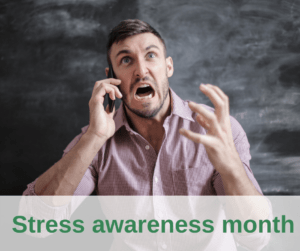
Stress awareness month
April is stress awareness month, held every year since 1992. It aims to raise awareness about stress and the knock effects such as anxiety and mental health problems. A UK-wide stress survey found that almost three quarters of adults have at some point over the past year been so stressed they felt overwhelmed or unable to cope. Stress comes in many forms – be it work, emotional or physical stress. But the stress response your body produces is always the same.
For example, you are walking down a dark alley at night and hear a noise… your hair stands on end and you take a sharp intake of breath, your heart rate and blood pressure increase, you are alert and ready to fight or run. This is caused by the release of adrenaline. This is a perfect mechanism for dealing with short-term acute stress. Think of the zebra on the savanna eating grass and suddenly a lion appears, the zebra produces adrenaline kicks out and bolts running for its life. If it gets away the stress has passed, and the zebra goes back to eating grass.
We have exactly the same stress response, but we are not being chased by lions. We are sat in traffic, shouting at children, or dealing with the backlog of 100 emails. Unfortunately, we are chronically exposed to stress. Just turn on the TV – covid, war, energy crisis… plus work, family and our environment… chronic long term stress!
We also produce cortisol in response to long-term stress, this hormone is involved in blood sugar regulation and is a powerful anti-inflammatory. These stress hormones are poorly adapted to long-term chronic stress. Cortisol can cause fat storage around the middle such as belly fat, damages neurones (think brain health) and it suppresses immunity and is perhaps one of the main reasons you tend to get ill if you’re under a lot of stress.
Managing and removing stress is the way to look, feel and think better. There are many things you can do to lower your stress…
Exercise – this is a great stress reliever for many people, being in the gym or going out for a run to get away from the family and things that have been on your mind. Take time to exercise as it also releases endorphins – brain chemicals that lift your mood. Consider relaxing exercises such as Tai Chi, Qi Gong, Yoga and simple diaphragmatic breathing. These exercises help calm the nervous system down and stimulate rest and repair.
Stabilise your blood sugar levels – this will involve eating adequate amounts of protein, fat and low GL carbohydrate at each meal. Poorly controlled blood sugar is a stress and how do you manage this…. Yep – you release adrenalin and cortisol!
Turn the lights out – getting plenty of sleep (8-9 hours each night) in a dark quiet room helps to re-establish normal circadian rhythms of cortisol and melatonin. Sleep is essential for physical and mental restoration.
Eliminate drainers – this involves identifying people or situations that rob you of energy. Once you have identified these people and situations work toward reducing your exposure to them.
Massage and acupuncture – these treatments can be very relaxing and relieve stress. Do you remember how great you felt after your last massage?
Learn to say NO – be in control of your own destiny and learn to say no to people.
Have fun everyday – laughter can be a powerful healer. Spend time with and those that make you laugh can make you feel better about yourself and aid in your journey to health. When asked what the meaning of life was, the Dalai Lama replied “to have fun”.




